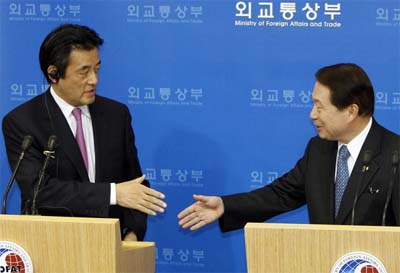The South Korean government has expressed its desire for a joint statement that will include a proper statement of remorse by Japan for its actions in Korea from 1910 until 1945.
In a meeting Thursday with Yu Myung-hwan, minster of foreign affairs and trade, Okada unambivalently expressed his understanding for the pain caused to the Korean people by Japan’s usurpation of their country, and expressed his desire that the two countries can settle their disputes and build a forward-looking relationship.
Of course, Japan has apologized to South Korea before, and many — not only conservatives — will wonder why Japan has to apologize again. Okada’s remarks provide some hint as to why Japan still has work to do on historical reconciliation. Rarely has a Japanese statesman shown that he is apologizing because he has looked at his country’s behavior through the eyes of its victims and come to appreciate just how destructive Japan’s actions were.
Diametrically opposed to Okada’s attitude is that of Japan’s revisionist right, which not only thinks Japan did nothing it has to apologize for in Korea or China, but actually denies that the Koreans and Chinese have legitimate grievances against Japan. Consider the arguments made by Tamogami Toshio, the now-retired Air Self-Defense Forces general who has become a prominent conservative spokesman since being driven from the service for his essay denying that Japan was an aggressor. In that essay, not only does Tamogami claim that Japan ‘advanced into’ Korea with the ‘understanding’ of its government (so understanding, in fact, that Korea’s ruling dynasty willingly signed a treaty ending its own reign, willingly if one ignores the Korean government’s pleas to the Western powers at The Hague to save it from Japan), he claims that under Japanese rule Korea was ‘prosperous and safe.’ After all, he writes, Korea’s population nearly doubled! The Japanese were in Korea as liberators! (‘The people in these areas were released from the oppression they had been subjected to up until then, and their standard of living markedly improved.’) Japan built universities in its colonies! It permitted Koreans to fight for Japan!
No mention, of course, of what the Korean people wanted. Did they ask for Japan to develop their country for them? Or to replace the Korean language with Japanese, Korean names with Japanese names? For that matter, did they ask for the privilege of fighting and dying on behalf of the Japanese emperor?
It is for this reason that Okada’s almost matter-of-fact statement is significant. It should be simply a matter of fact when a Japanese official acknowledges the tremendous pain caused by his country to its neighbors — and that a not insignificant portion of elite opinion can see little or nothing wrong with Japan’s behavior means that there is a great need for more matter-of-fact statements like Okada’s, and yes, a joint statement that unambiguously acknowledges Japan’s wrongdoing in specific terms (not just the general statements of remorse) while looking to build a new relationship for the future.
As a final note on this matter, I think it is important to take issue with Tamogami’s comparison of Japan’s behavior in Korea with the behavior of the Western powers in their Asian colonies (the British in India is a favorite example). While the comparison has some merits, it is by no means the best comparison. The best comparison that comes to mind when I think of Japanese rule in Korea is not the British in India but the British in Ireland. After all, how can British rule in India — which was in many ways indirect, even after 1857 — be compared to the brutal domination of an immediate neighbor? Indeed, British rule in Ireland was far more brutal than even Japanese rule in Korea, lasting longer and having ever-more devastating consequences. The Great Potato Famine, for which Tony Blair apologized early in his premiership, was only one of the more monstrous moments in the bloody history of British rule in Ireland. The Irish still curse Oliver Cromwell, nearly four centuries after his invasion of Ireland cemented British rule.
The point of looking to British rule in Ireland is that nations have long memories — even longer memories when the harm done to them was by a close neighbour, nations with shared destinies thanks to geography. On top of the weight of history is the natural resentment felt by small countries at being dominated by their larger neighbors. Why should Japanese expect that Koreans will simply ‘get over’ Japanese rule, which began only a century ago and was brutal in its own right, if not nearly as prolonged or as total as British rule in Ireland? More importantly, what right do Japanese have to tell Koreans (or Chinese) what the appropriate level of remorse is? Japanese leaders need to stop thinking of the rectification of history has simply being a matter of the number of apologies rendered and recognize, as Okada does (and, I think, Prime Minister Hatoyama does), that less important than the number of apologies is seeing history through Korean or Chinese eyes and acknowledging that the humiliation experienced by colonized peoples is not something that can be balanced out by a list of universities established or a tabulation of miles of train tracks built, and, moreover, cannot be expressed in terms of the numbers of victims, as meaningful as those numbers are. As the Irish experience suggests, in some way these wounds never heal completely.
But at least the Hatoyama government is determined to take a big step forward. Building a constructive relationship with South Korea is too important to allow Japan to continue to be held back by the unwillingness of Japanese nationalists to accept any people’s love of country but their own as legitimate.

